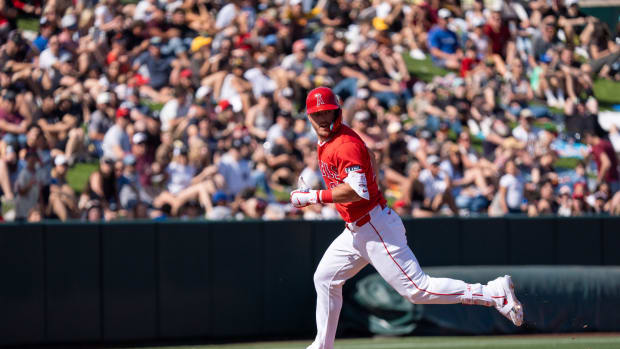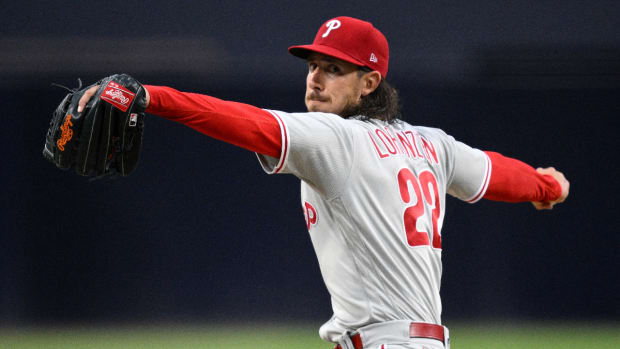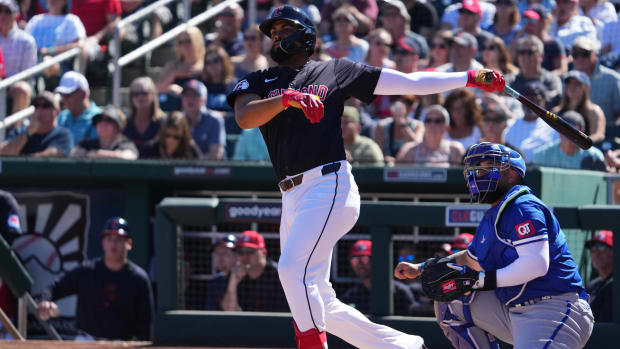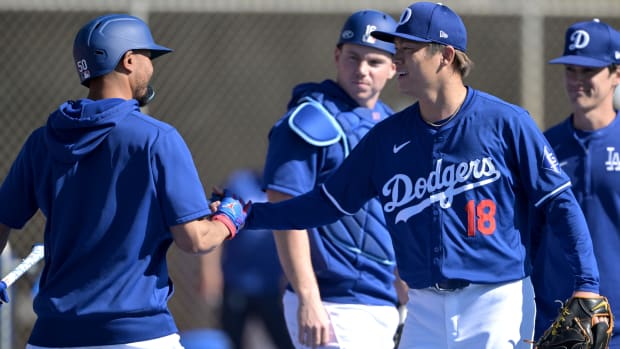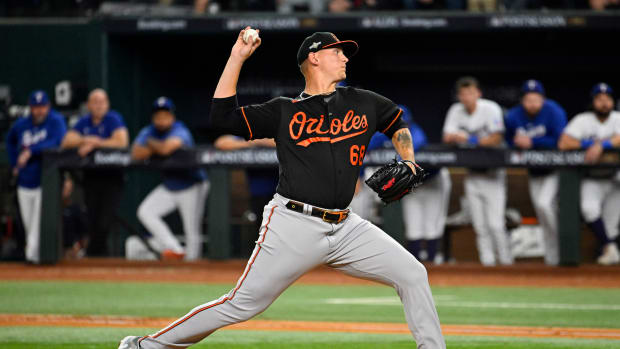Inside Andrew McCutchen's decline, from analytics to the clubhouse
Your teams. Your favorite writers. Wherever you want them. Personalize SI with our new App. Install on iOSor Android.
The Pittsburgh Pirates entered play on May 28 with a 28-19 record, which left them 4 1/2 games out in the National League Central and leading the NL wild-card race. They ended play on June 28 at 37-41, now 14 games behind the Cubs in the division and 4 1/2 out in the wild-card. That 9-22 tailspin has sent Pittsburgh into the reality of a Transitional Year, though for the time being the team's public posture must be, “Sure, we can play 56-28 baseball the rest of the way and get back to the wild-card game.” The Pirates will try to establish young starters Jameson Taillon, Chad Kuhl and Tyler Glasnow (before shutting them down, of course) and continue to emphasize contact hitting and taking pitches while most of baseball has flipped into Home Run Derby.
Coming off wild-card seasons of 94, 88 and 98 wins, Pittsburgh began this season with rightful hopes of its first division title in 24 years. The Cubs, however, quickly destroyed those thoughts. The Pirates have gone 1-8 against Chicago this year, and they needed only 60 games to fall 10 games out. Injuries to ace Gerrit Cole and catcher Francisco Cervelli hastened the collapse.
Among all of the Mysteries of Pittsburgh that put this season on the brink so quickly, none are bigger than this stunner: What happened to centerfielder Andrew McCutchen? One of the best, most consistent players in major league baseball is, at only 29 years old, a shell of himself.
“In [a] month he might be the best player in the game,” said one rival executive. “But right now? He doesn’t look the same. He’s not a threat at all on offense, his defense isn’t very good and his body language on the field is miserable. I always looked at him as the cheerleader of that group, the guy who gets them started. He doesn’t appear that way at all right now.”
The man with hitting hands among the fastest in the game is getting beat by fastballs. He is striking out more often, walking less often, hitting more balls in the air without power, making soft contact more often and running a lot less—all at the worst rates of his career. Less meaningfully, though almost as quizzically, he recently was thrown out of a game for slamming his bat to the ground after a called third strike, and on Monday he took off sprinting in a direct line from third base on a 3-and-2 pitch with two outs and the bases loaded, putting himself in harm’s way of a foul ball when the protocol is to break slowly and well wide of the baseline.
It’s been that kind of odd year for the former Mr. Reliable. You have to understand the greatness of McCutchen to grasp how strange it is to see him struggle like this. Last year he became only the 13th player since 1900 to post an OPS+ of at least 120 for each of the first seven years of his career (min. 100 games per season)—and the first to do so since Albert Pujols (2001 to '07).
McCutchen was named to his fifth straight All-Star Game. He finished in the top five in NL MVP voting for a fourth straight year, including winning the award in 2013. He was the epitome of a franchise player, one who signed away the highest potential earnings years of his career (ages 25 through 31) to remain in Pittsburgh on a below-market deal. (By the time each is 31, fellow 2005 first-round pick Justin Upton will have earned more than twice as much money as McCutchen, $140 million to $65 million, despite being far less productive.)
• Pirates' lost June fueling trade talk surrounding McCutchen
Now McCutchen is grinding to a below average OPS+ of 97. Here is a look at his across-the-board decline:
Fastballs: McCutchen entered this year as a career .327 hitter against two- and four-seam fastballs. This year he is hitting only .280 against heaters, and for the first time in his career, he has a negative value against fastballs, according to Pitch FX metrics. Pitchers once avoided throwing him fastballs. Now the scouting reports tell them to feed fastballs to him.
Strikeouts: He is whiffing in 24.7% of his plate appearances, a steep jump from his previous worst of 19.6%, back in 2012.
Table-setting: With the bases empty, McCutchen has hit .232, but with nine home runs, suggesting he more often sells out for the long ball when it is not an RBI situation.
Weak contact: McCutchen already has hit more infield pop-ups (12) than he did all of last year (10). His soft contact percentage (20.0) is a career worst.
Defense: McCutchen grades below average for Defensive Runs Saved for a third straight year.
Baserunning: McCutchen has scored from second base on a single only twice all year. Note the decline in his percentages of taking the extra base over the past four years: 64, 41, 29, 25. Major league average is about 41%. Catchers Yadier Molina and Carlos Ruiz take the extra base more often than McCutchen. (Baserunning is a team-wide problem. Pittsburgh is the worst team in the league at taking the extra base.)
Base stealing: He no longer is a serious threat to steal a base. McCutchen, who entered this year with a 74% success rate swiping bags, has tried to steal only seven times in 109 opportunities—and been thrown out five of those times.
So what happened? McCutchen has played through a swollen right thumb, but that injury has been an issue in June, not in April and May. “He’s always been a slow starter,” manager Clint Hurdle told me two weeks ago. “This one has just lasted a little longer.”
McCutchen’s role on the team this year changed in several ways. The club parted with second baseman Neil Walker, an influential clubhouse leader, and infielder Pedro Alvarez, a home run threat and one of his good friends. Walker and Alvarez had combined for 43 home runs last year, which may have shifted more power responsibility to McCutchen. Hurdle also moved McCutchen out of his customary No. 3 spot in the lineup to second, as well as out of his customary deep positioning in centerfield. Both moves were driven by analytics.
• Subscribe to get the best of Sports Illustrated delivered right to your inbox
According to Hurdle, Pirates operations people found that Pittsburgh outfielders last year were hurt more often by balls hit in front of them (many of which skittered by them for extra bases) than by balls over their heads. “And it wasn’t even close,” Hurdle said.
Moreover, Hurdle said, runners routinely took extra bases on McCutchen because of his extreme depth. Hurdle said he shared those findings with McCutchen. The manager said the outfielder not only bought into the shallower positioning but also remarked that Mets centerfielder Juan Lagares played a shallow centerfield. Lagares won the 2014 NL Gold Glove for centerfielders, an honor McCutchen won in 2012.
When McCutchen reported to spring training, he found white dots spray-painted into the outfields of the practice fields in order to acclimate the outfielders to their new positioning—about 15 feet closer to the plate than last year. Hurdle said McCutchen this year is playing “the best centerfield of his career, without a doubt.” The metrics disagree. McCutchen has been better at preventing runners from taking extra bases, but his overall fielding metrics are still below average.
As for Pittsburgh’s team defense: It is below average in defensive efficiency (eighth in the league) and below average on batting average on balls in play (ninth), including the worst in the league at defending flyballs (15th).
Three years ago, in his MVP season, McCutchen posted a whopping 1.001 OPS in the second half. (Over his career, and despite the “slow starter” reputation, his second half OPS actually is a bit worse than his first half OPS.) How many people would be surprised to see a 29-year-old, five-tool player rebound with a similar monster second half this season? Not many. All the tools still are there. Youth is on his side. The only real surprise is that McCutchen has been this bad for this long.































